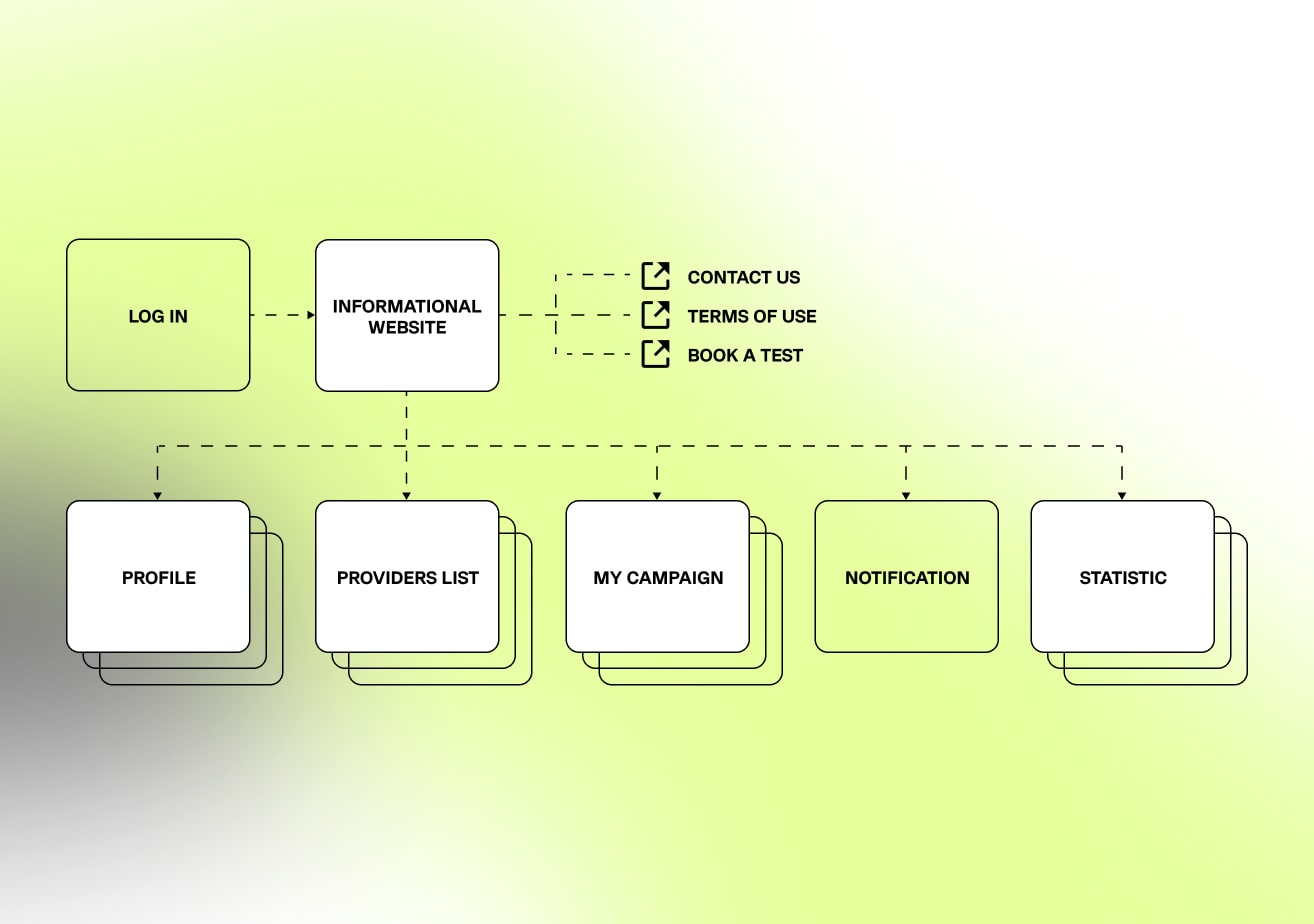Our client needed a comprehensive marketing platform to optimise its advertising efforts and maximise ROI. Computools helped to develop a platform that combined disparate services into a single unified system, reduced complexity through an optimised technology stack, and improved usability and accessibility for publishers, advertisers, agencies, and brands.
The client is a marketing platform based in Canada that has existed since 2014. The company aims to provide publishers, ad networks, and SSPs (ad sales platforms) with solutions to increase demand and profitability. They focus on creating access to high-performing ads, automating processes, and providing transparency for advertisers.
The client’s project had challenges, such as fragmentation of the final product into multiple services, failed architectural decisions requiring different programming languages for different project parts, and ongoing maintenance. At the same time, the client was undertaking a global ad tech project and was looking to improve programmatic advertising, particularly removing hidden costs and fraud issues, which ultimately reduced the advertisers’ return on ad budget (ROAS).
We offered a comprehensive solution, starting with the modernisation of the marketing platform that met the client’s original requirements. We successfully implemented functionality to ensure easy integration and usability for publishers, advertisers, agencies, and brands. We also addressed the following key challenges:
The client was completely satisfied with the association with Computools’s professional team. The platform created allows easy integration and suits publishers, advertisers, agencies and brands.
Several key issues we solved:
The client chose Computools as its development partner because Computools demonstrated extensive experience and expertise in developing complex projects, particularly in the ad tech industry. The team’s proficiency in handling diverse technologies and languages was a key factor in the selection process.
This aligned well with the client’s aspirations for a comprehensive marketing platform with a global impact.
The client’s main goal was to build a better web by removing disruptive display ads from every website and replacing them with beautiful and consumable native ads. To achieve this, they aimed to supply publishers with powerful tools and responsive widgets.
Computools role
After negotiations, we were ready to offer them experienced developers and a Project Manager. During the project, we contacted the client’s coordinator and continually reported progress.
Key decisions and outcomes
Upon completion of the project, the client and Computools established a seamless arrangement for ongoing collaboration and support. The process involved meticulous planning and execution:
The customer provided us with a ready-made platform design for refinement. The designers, who were a part of the team, made an audit of the prototype, added the necessary edits and proposed several more innovations that increased the platform's usability for the client.

Crafting detailed profiles representing target users and their needs.

Designing a visual representation outlining the website's hierarchical structure.

Developing skeletal frameworks to depict page layouts and structure.

Designing an intuitive and visually appealing interface for seamless user interaction.
PHP
PHP (Hypertext Preprocessor) is a server-side web programming language widely used for web development. PHP is dynamic and combines with HTML to display dynamic elements on the page. It can be used with many relational database management systems, runs on the most popular web servers, and is available for many different operating systems.
Yll
Yii is an open-source platform that provides developers with the fastest option for building large-scale web applications. It is seamless in nature, gives a faster performance, and is most suitable for creating e-commerce frames, content data management systems, and forums.
PHALCON
Phalcon has a compiled code, and there is no interpretation. It provides lower overhead for the model-view-controller (MVC) based applications. The speed is far better than any other available framework.
NODE.JS
Node.js is a full-stack JavaScript for serving both client-side and server-side applications. An important benefit of Node.js is the code's running speed, which in turn increases the speed of any framework.
REDIS
Redis is an open-source, in-memory and key/value NoSQL database. Known to be an exceptionally fast in-memory database, Redis is used as a database, cache and message broker. It supports five data types – strings, hashes, lists, sets and sorted sets – and two special types of data – Bitmap and HyperLog.
SCALA
Scala's complex features promote better coding and increase performance. Functions, macros and tuples are just a few of Scala's advancements. Scala incorporates functional programming and object-oriented programming into a powerful language.
ANGULARJS
AngularJS is an open-source framework that addresses the challenges of web development processes. It is a framework for web apps and one of the most powerful front-end frameworks. The Angular framework allows the use of HTML as the template language and the extension of HTML's syntax to express the application's components in a brief and clear manner.
JQUERY
jQuery is the most outstanding cross-browser javascript library compiled for ease of client-side HTML scripting. It helps to simplify and standardise interactions between JavaScript code and HTML elements. JavaScript allows websites to be interactive and dynamic, and jQuery is a tool that helps streamline that process.
JS
JavaScript is one of the easiest, most versatile, and most effective languages for extending website functionality. It helps in on-screen visual effects and processing and calculating data on web pages with ease. It also provides extended website functionality using third-party scripts among several other handy features.
CSS
CSS is a language used to detail the presentation of a web page's mark-up language, such as colours, fonts and layout. One of its key benefits is the way it allows the separation of document content from document presentation. CSS also saves much time, particularly when maintaining a large site. In particular, external style sheets can be updated across a whole website by updating a single document.
HTML
HTML or Hyper-text Mark-up Language is a globally accepted programming language for formatting web pages. Through HTML, the look and appearance of images, links, headings, text, page layout and just about every element of a web page can be formatted. Of all the web programming languages, HTML is the most search engine friendly. Creating SEO-compliant websites using HTML is significantly easier than any other programming language.
MySQL
MySQL is globally renowned for being the most secure and reliable database management system used in popular web applications. It features a distinct storage-engine framework that aids system administrators in configuring the MySQL database server for flawless performance. MySQL is guaranteed 24/7 and offers a wide range of high-availability solutions, including specialised cluster servers and master/slave replication configurations.
MARIADB
MariaDB is an open-source relational database management system (DBMS). MariaDB is based on SQL and supports ACID-style data processing with guaranteed atomicity, consistency, isolation and durability for transactions. The database also supports JSON APIs, parallel data replication, and multiple storage engines, including InnoDB, MyRocks, Spider, Aria, TokuDB, Cassandra, and MariaDB ColumnStore.
MONGODB
MongoDB is a document-oriented database. Data is organised as JSON documents (rows equivalent) with fields (columns equivalent), which are grouped into collections (tables equivalent). It has advantages: flexibility (lack of rigid structure), a good fit for modern JavaScript frameworks (direct use of JSON), big data processing, and real-time statistics/data analysis.
Kanban is a process designed to help teams work together more effectively. Kanban offers a systematic approach to identifying opportunities for improving efficiency. Plus, Kanban is an ongoing practice, so teams can leverage its principles in their everyday work instead of stopping what they are doing to focus on a new improvement initiative.
Kanban is based on iterative work or work done in small segments to reduce the amount of re-work in case any changes occur. For this reason, customers of a team practising Kanban can provide honest feedback and request changes during a particular iteration while preserving the timeline and keeping the budget in check.


Computools is a trusted partner that has helped us transform our marketing operations. Their team is knowledgeable, experienced, and always goes the extra mile.